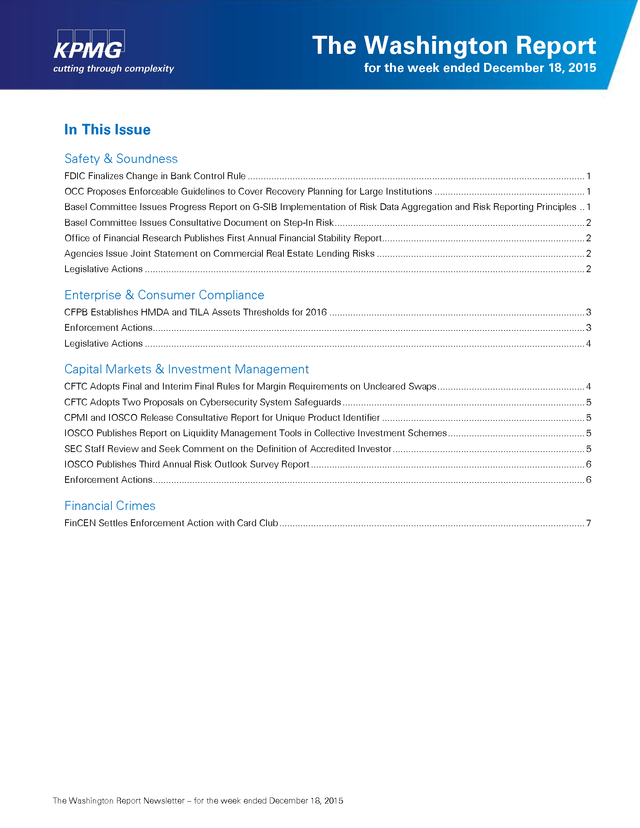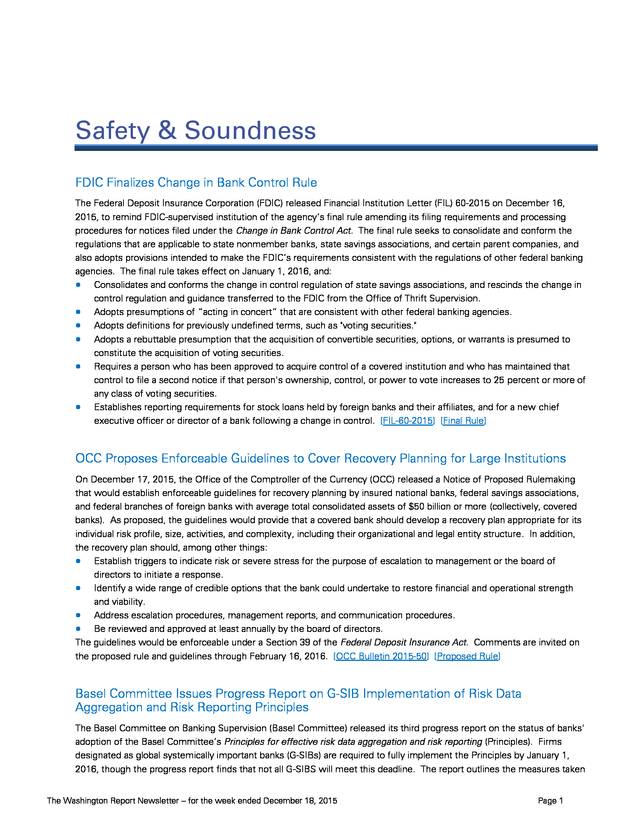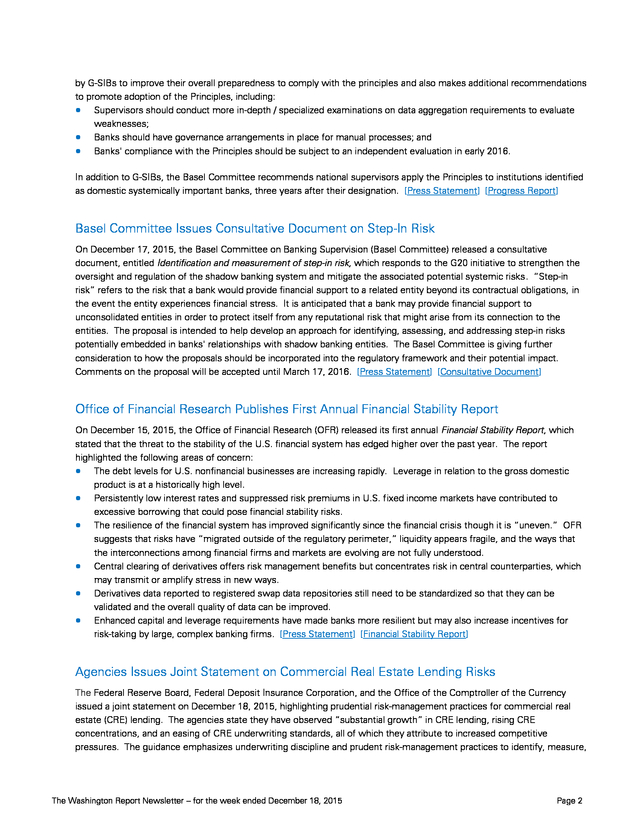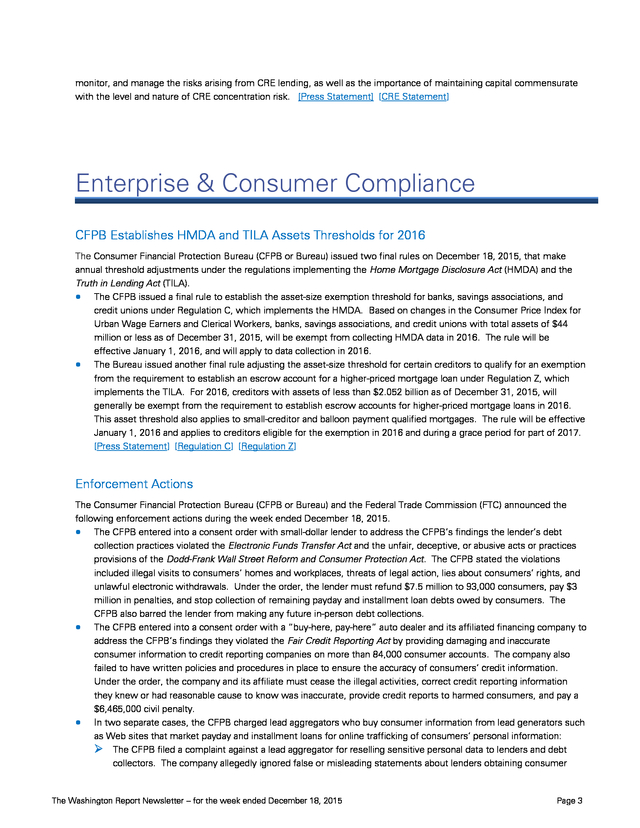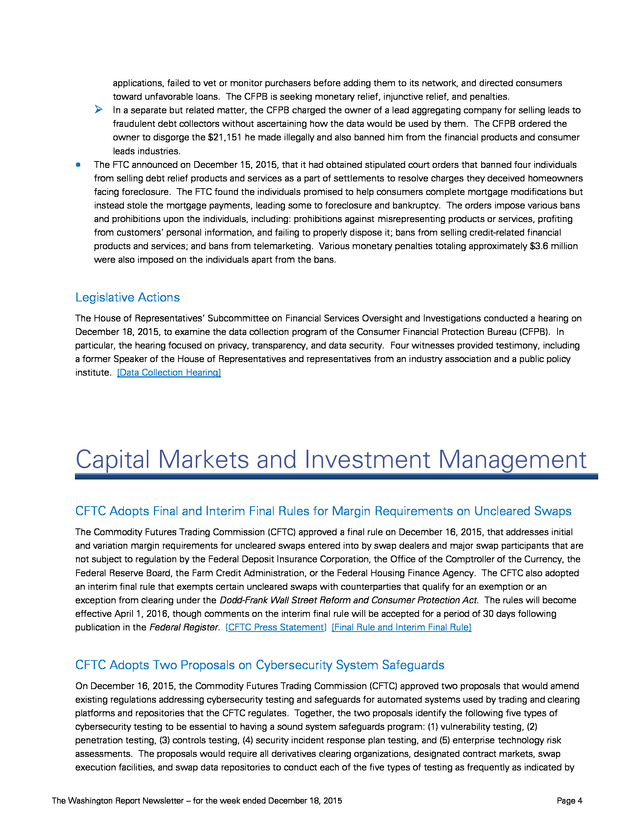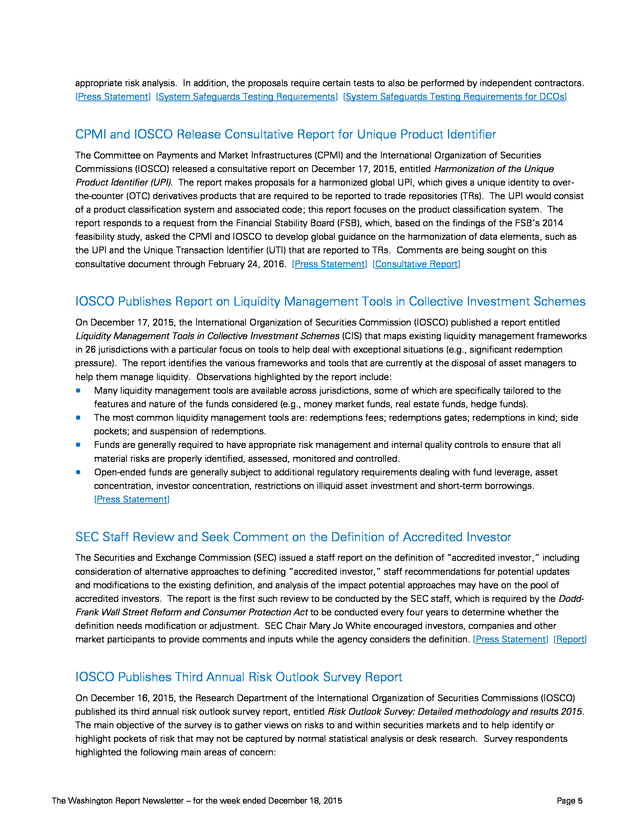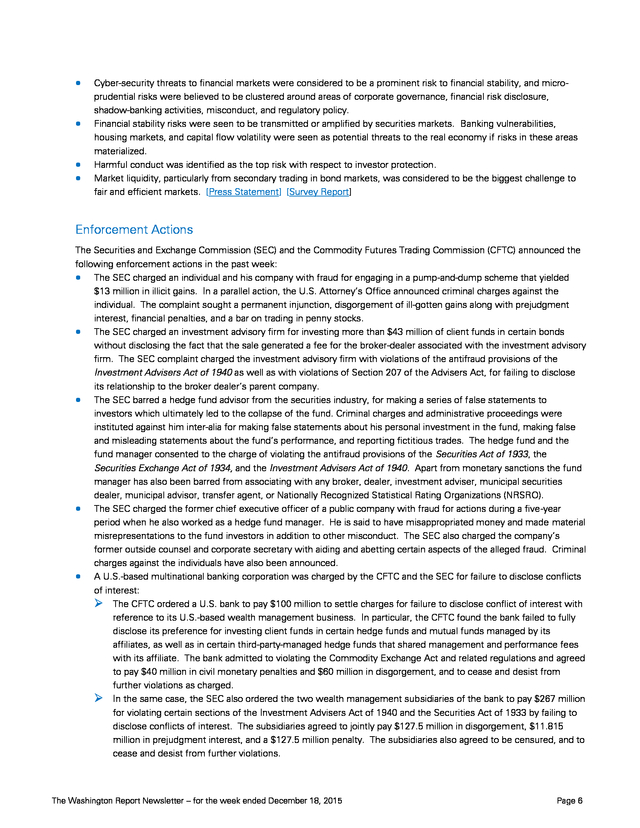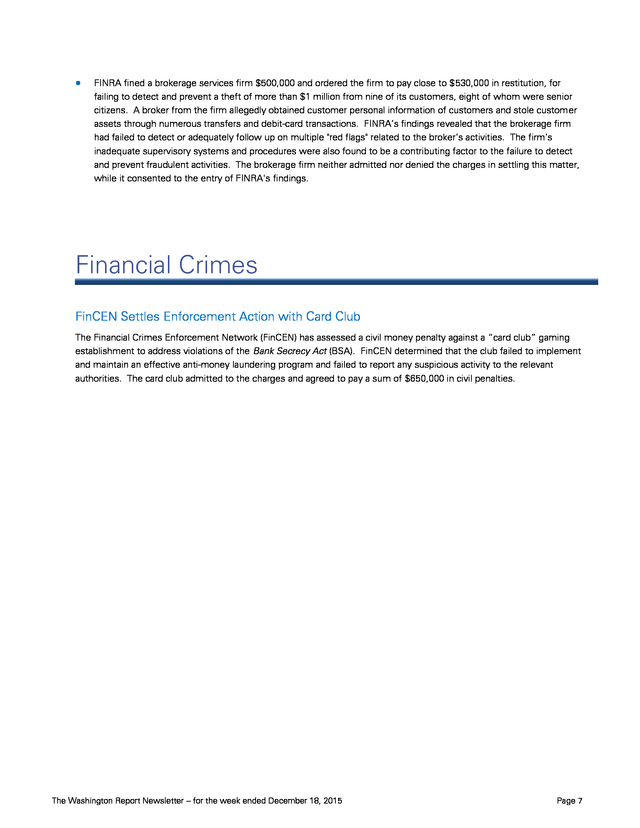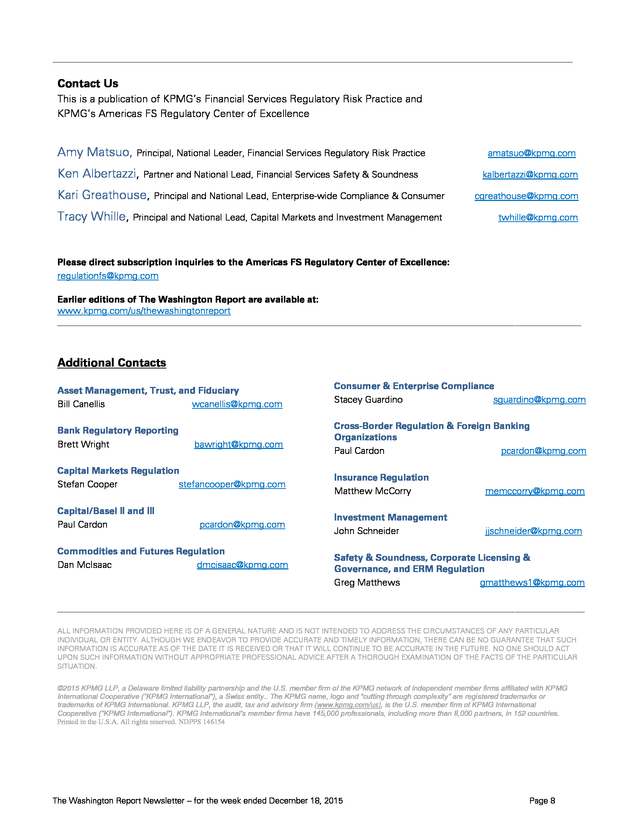Description
The Washington Report
for the week ended December 18, 2015
In This Issue
Safety & Soundness
FDIC Finalizes Change in Bank Control Rule ................................................................................................................................ 1
OCC Proposes Enforceable Guidelines to Cover Recovery Planning for Large Institutions ......................................................... 1
Basel Committee Issues Progress Report on G-SIB Implementation of Risk Data Aggregation and Risk Reporting Principles .. 1
Basel Committee Issues Consultative Document on Step-In Risk ...............................................................................................
2 Office of Financial Research Publishes First Annual Financial Stability Report............................................................................. 2 Agencies Issue Joint Statement on Commercial Real Estate Lending Risks ............................................................................... 2 Legislative Actions .......................................................................................................................................................................
2 Enterprise & Consumer Compliance CFPB Establishes HMDA and TILA Assets Thresholds for 2016 ................................................................................................. 3 Enforcement Actions.................................................................................................................................................................... 3 Legislative Actions .......................................................................................................................................................................
4 Capital Markets & Investment Management CFTC Adopts Final and Interim Final Rules for Margin Requirements on Uncleared Swaps ........................................................ 4 CFTC Adopts Two Proposals on Cybersecurity System Safeguards ............................................................................................ 5 CPMI and IOSCO Release Consultative Report for Unique Product Identifier .............................................................................
5 IOSCO Publishes Report on Liquidity Management Tools in Collective Investment Schemes .................................................... 5 SEC Staff Review and Seek Comment on the Definition of Accredited Investor ......................................................................... 5 IOSCO Publishes Third Annual Risk Outlook Survey Report ........................................................................................................
6 Enforcement Actions.................................................................................................................................................................... 6 Financial Crimes FinCEN Settles Enforcement Action with Card Club .................................................................................................................... 7 The Washington Report Newsletter – for the week ended December 18, 2015 .
The Washington Report Safety & Soundness FDIC Finalizes Change in Bank Control Rule The Federal Deposit Insurance Corporation (FDIC) released Financial Institution Letter (FIL) 60-2015 on December 16, 2015, to remind FDIC-supervised institution of the agency’s final rule amending its filing requirements and processing procedures for notices filed under the Change in Bank Control Act. The final rule seeks to consolidate and conform the regulations that are applicable to state nonmember banks, state savings associations, and certain parent companies, and also adopts provisions intended to make the FDIC’s requirements consistent with the regulations of other federal banking agencies. The final rule takes effect on January 1, 2016, and: ï‚· Consolidates and conforms the change in control regulation of state savings associations, and rescinds the change in control regulation and guidance transferred to the FDIC from the Office of Thrift Supervision. ï‚· Adopts presumptions of “acting in concert” that are consistent with other federal banking agencies. ï‚· Adopts definitions for previously undefined terms, such as "voting securities." ï‚· Adopts a rebuttable presumption that the acquisition of convertible securities, options, or warrants is presumed to constitute the acquisition of voting securities. ï‚· Requires a person who has been approved to acquire control of a covered institution and who has maintained that control to file a second notice if that person's ownership, control, or power to vote increases to 25 percent or more of any class of voting securities. ï‚· Establishes reporting requirements for stock loans held by foreign banks and their affiliates, and for a new chief executive officer or director of a bank following a change in control. [FIL-60-2015] [Final Rule] OCC Proposes Enforceable Guidelines to Cover Recovery Planning for Large Institutions On December 17, 2015, the Office of the Comptroller of the Currency (OCC) released a Notice of Proposed Rulemaking that would establish enforceable guidelines for recovery planning by insured national banks, federal savings associations, and federal branches of foreign banks with average total consolidated assets of $50 billion or more (collectively, covered banks).
As proposed, the guidelines would provide that a covered bank should develop a recovery plan appropriate for its individual risk profile, size, activities, and complexity, including their organizational and legal entity structure. In addition, the recovery plan should, among other things: ï‚· Establish triggers to indicate risk or severe stress for the purpose of escalation to management or the board of directors to initiate a response. ï‚· Identify a wide range of credible options that the bank could undertake to restore financial and operational strength and viability. ï‚· Address escalation procedures, management reports, and communication procedures. ï‚· Be reviewed and approved at least annually by the board of directors. The guidelines would be enforceable under a Section 39 of the Federal Deposit Insurance Act. Comments are invited on the proposed rule and guidelines through February 16, 2016.
[OCC Bulletin 2015-50] [Proposed Rule] Basel Committee Issues Progress Report on G-SIB Implementation of Risk Data Aggregation and Risk Reporting Principles The Basel Committee on Banking Supervision (Basel Committee) released its third progress report on the status of banks' adoption of the Basel Committee’s Principles for effective risk data aggregation and risk reporting (Principles). Firms designated as global systemically important banks (G-SIBs) are required to fully implement the Principles by January 1, 2016, though the progress report finds that not all G-SIBS will meet this deadline. The report outlines the measures taken The Washington Report Newsletter – for the week ended December 18, 2015 Page 1 .
by G-SIBs to improve their overall preparedness to comply with the principles and also makes additional recommendations to promote adoption of the Principles, including: ï‚· Supervisors should conduct more in-depth / specialized examinations on data aggregation requirements to evaluate weaknesses; ï‚· Banks should have governance arrangements in place for manual processes; and ï‚· Banks' compliance with the Principles should be subject to an independent evaluation in early 2016. In addition to G-SIBs, the Basel Committee recommends national supervisors apply the Principles to institutions identified as domestic systemically important banks, three years after their designation. [Press Statement] [Progress Report] Basel Committee Issues Consultative Document on Step-In Risk On December 17, 2015, the Basel Committee on Banking Supervision (Basel Committee) released a consultative document, entitled Identification and measurement of step-in risk, which responds to the G20 initiative to strengthen the oversight and regulation of the shadow banking system and mitigate the associated potential systemic risks. “Step-in risk” refers to the risk that a bank would provide financial support to a related entity beyond its contractual obligations, in the event the entity experiences financial stress. It is anticipated that a bank may provide financial support to unconsolidated entities in order to protect itself from any reputational risk that might arise from its connection to the entities.
The proposal is intended to help develop an approach for identifying, assessing, and addressing step-in risks potentially embedded in banks' relationships with shadow banking entities. The Basel Committee is giving further consideration to how the proposals should be incorporated into the regulatory framework and their potential impact. Comments on the proposal will be accepted until March 17, 2016. [Press Statement] [Consultative Document] Office of Financial Research Publishes First Annual Financial Stability Report On December 15, 2015, the Office of Financial Research (OFR) released its first annual Financial Stability Report, which stated that the threat to the stability of the U.S.
financial system has edged higher over the past year. The report highlighted the following areas of concern: ï‚· The debt levels for U.S. nonfinancial businesses are increasing rapidly.
Leverage in relation to the gross domestic product is at a historically high level. ï‚· Persistently low interest rates and suppressed risk premiums in U.S. fixed income markets have contributed to excessive borrowing that could pose financial stability risks. ï‚· The resilience of the financial system has improved significantly since the financial crisis though it is “uneven.” OFR suggests that risks have “migrated outside of the regulatory perimeter,” liquidity appears fragile, and the ways that the interconnections among financial firms and markets are evolving are not fully understood. ï‚· Central clearing of derivatives offers risk management benefits but concentrates risk in central counterparties, which may transmit or amplify stress in new ways. ï‚· Derivatives data reported to registered swap data repositories still need to be standardized so that they can be validated and the overall quality of data can be improved. ï‚· Enhanced capital and leverage requirements have made banks more resilient but may also increase incentives for risk-taking by large, complex banking firms. [Press Statement] [Financial Stability Report] Agencies Issues Joint Statement on Commercial Real Estate Lending Risks The Federal Reserve Board, Federal Deposit Insurance Corporation, and the Office of the Comptroller of the Currency issued a joint statement on December 18, 2015, highlighting prudential risk-management practices for commercial real estate (CRE) lending.
The agencies state they have observed “substantial growth” in CRE lending, rising CRE concentrations, and an easing of CRE underwriting standards, all of which they attribute to increased competitive pressures. The guidance emphasizes underwriting discipline and prudent risk-management practices to identify, measure, The Washington Report Newsletter – for the week ended December 18, 2015 Page 2 . monitor, and manage the risks arising from CRE lending, as well as the importance of maintaining capital commensurate with the level and nature of CRE concentration risk. [Press Statement] [CRE Statement] Enterprise & Consumer Compliance CFPB Establishes HMDA and TILA Assets Thresholds for 2016 The Consumer Financial Protection Bureau (CFPB or Bureau) issued two final rules on December 18, 2015, that make annual threshold adjustments under the regulations implementing the Home Mortgage Disclosure Act (HMDA) and the Truth in Lending Act (TILA). ï‚· The CFPB issued a final rule to establish the asset-size exemption threshold for banks, savings associations, and credit unions under Regulation C, which implements the HMDA. Based on changes in the Consumer Price Index for Urban Wage Earners and Clerical Workers, banks, savings associations, and credit unions with total assets of $44 million or less as of December 31, 2015, will be exempt from collecting HMDA data in 2016. The rule will be effective January 1, 2016, and will apply to data collection in 2016. ï‚· The Bureau issued another final rule adjusting the asset-size threshold for certain creditors to qualify for an exemption from the requirement to establish an escrow account for a higher-priced mortgage loan under Regulation Z, which implements the TILA.
For 2016, creditors with assets of less than $2.052 billion as of December 31, 2015, will generally be exempt from the requirement to establish escrow accounts for higher-priced mortgage loans in 2016. This asset threshold also applies to small-creditor and balloon payment qualified mortgages. The rule will be effective January 1, 2016 and applies to creditors eligible for the exemption in 2016 and during a grace period for part of 2017. [Press Statement] [Regulation C] [Regulation Z] Enforcement Actions The Consumer Financial Protection Bureau (CFPB or Bureau) and the Federal Trade Commission (FTC) announced the following enforcement actions during the week ended December 18, 2015. ï‚· The CFPB entered into a consent order with small-dollar lender to address the CFPB’s findings the lender’s debt collection practices violated the Electronic Funds Transfer Act and the unfair, deceptive, or abusive acts or practices provisions of the Dodd-Frank Wall Street Reform and Consumer Protection Act. The CFPB stated the violations included illegal visits to consumers’ homes and workplaces, threats of legal action, lies about consumers’ rights, and unlawful electronic withdrawals.
Under the order, the lender must refund $7.5 million to 93,000 consumers, pay $3 million in penalties, and stop collection of remaining payday and installment loan debts owed by consumers. The CFPB also barred the lender from making any future in-person debt collections. ï‚· The CFPB entered into a consent order with a “buy-here, pay-here” auto dealer and its affiliated financing company to address the CFPB’s findings they violated the Fair Credit Reporting Act by providing damaging and inaccurate consumer information to credit reporting companies on more than 84,000 consumer accounts. The company also failed to have written policies and procedures in place to ensure the accuracy of consumers’ credit information. Under the order, the company and its affiliate must cease the illegal activities, correct credit reporting information they knew or had reasonable cause to know was inaccurate, provide credit reports to harmed consumers, and pay a $6,465,000 civil penalty. ï‚· In two separate cases, the CFPB charged lead aggregators who buy consumer information from lead generators such as Web sites that market payday and installment loans for online trafficking of consumers’ personal information:  The CFPB filed a complaint against a lead aggregator for reselling sensitive personal data to lenders and debt collectors.
The company allegedly ignored false or misleading statements about lenders obtaining consumer The Washington Report Newsletter – for the week ended December 18, 2015 Page 3 . ï‚· applications, failed to vet or monitor purchasers before adding them to its network, and directed consumers toward unfavorable loans. The CFPB is seeking monetary relief, injunctive relief, and penalties.  In a separate but related matter, the CFPB charged the owner of a lead aggregating company for selling leads to fraudulent debt collectors without ascertaining how the data would be used by them. The CFPB ordered the owner to disgorge the $21,151 he made illegally and also banned him from the financial products and consumer leads industries. The FTC announced on December 15, 2015, that it had obtained stipulated court orders that banned four individuals from selling debt relief products and services as a part of settlements to resolve charges they deceived homeowners facing foreclosure. The FTC found the individuals promised to help consumers complete mortgage modifications but instead stole the mortgage payments, leading some to foreclosure and bankruptcy.
The orders impose various bans and prohibitions upon the individuals, including: prohibitions against misrepresenting products or services, profiting from customers’ personal information, and failing to properly dispose it; bans from selling credit-related financial products and services; and bans from telemarketing. Various monetary penalties totaling approximately $3.6 million were also imposed on the individuals apart from the bans. Legislative Actions The House of Representatives’ Subcommittee on Financial Services Oversight and Investigations conducted a hearing on December 18, 2015, to examine the data collection program of the Consumer Financial Protection Bureau (CFPB). In particular, the hearing focused on privacy, transparency, and data security.
Four witnesses provided testimony, including a former Speaker of the House of Representatives and representatives from an industry association and a public policy institute. [Data Collection Hearing] Capital Markets and Investment Management CFTC Adopts Final and Interim Final Rules for Margin Requirements on Uncleared Swaps The Commodity Futures Trading Commission (CFTC) approved a final rule on December 16, 2015, that addresses initial and variation margin requirements for uncleared swaps entered into by swap dealers and major swap participants that are not subject to regulation by the Federal Deposit Insurance Corporation, the Office of the Comptroller of the Currency, the Federal Reserve Board, the Farm Credit Administration, or the Federal Housing Finance Agency. The CFTC also adopted an interim final rule that exempts certain uncleared swaps with counterparties that qualify for an exemption or an exception from clearing under the Dodd-Frank Wall Street Reform and Consumer Protection Act.
The rules will become effective April 1, 2016, though comments on the interim final rule will be accepted for a period of 30 days following publication in the Federal Register. [CFTC Press Statement] [Final Rule and Interim Final Rule] CFTC Adopts Two Proposals on Cybersecurity System Safeguards On December 16, 2015, the Commodity Futures Trading Commission (CFTC) approved two proposals that would amend existing regulations addressing cybersecurity testing and safeguards for automated systems used by trading and clearing platforms and repositories that the CFTC regulates. Together, the two proposals identify the following five types of cybersecurity testing to be essential to having a sound system safeguards program: (1) vulnerability testing, (2) penetration testing, (3) controls testing, (4) security incident response plan testing, and (5) enterprise technology risk assessments.
The proposals would require all derivatives clearing organizations, designated contract markets, swap execution facilities, and swap data repositories to conduct each of the five types of testing as frequently as indicated by The Washington Report Newsletter – for the week ended December 18, 2015 Page 4 . appropriate risk analysis. In addition, the proposals require certain tests to also be performed by independent contractors. [Press Statement] [System Safeguards Testing Requirements] [System Safeguards Testing Requirements for DCOs] CPMI and IOSCO Release Consultative Report for Unique Product Identifier The Committee on Payments and Market Infrastructures (CPMI) and the International Organization of Securities Commissions (IOSCO) released a consultative report on December 17, 2015, entitled Harmonization of the Unique Product Identifier (UPI). The report makes proposals for a harmonized global UPI, which gives a unique identity to overthe-counter (OTC) derivatives products that are required to be reported to trade repositories (TRs). The UPI would consist of a product classification system and associated code; this report focuses on the product classification system.
The report responds to a request from the Financial Stability Board (FSB), which, based on the findings of the FSB’s 2014 feasibility study, asked the CPMI and IOSCO to develop global guidance on the harmonization of data elements, such as the UPI and the Unique Transaction Identifier (UTI) that are reported to TRs. Comments are being sought on this consultative document through February 24, 2016. [Press Statement] [Consultative Report] IOSCO Publishes Report on Liquidity Management Tools in Collective Investment Schemes On December 17, 2015, the International Organization of Securities Commission (IOSCO) published a report entitled Liquidity Management Tools in Collective Investment Schemes (CIS) that maps existing liquidity management frameworks in 26 jurisdictions with a particular focus on tools to help deal with exceptional situations (e.g., significant redemption pressure).
The report identifies the various frameworks and tools that are currently at the disposal of asset managers to help them manage liquidity. Observations highlighted by the report include: ï‚· Many liquidity management tools are available across jurisdictions, some of which are specifically tailored to the features and nature of the funds considered (e.g., money market funds, real estate funds, hedge funds). ï‚· The most common liquidity management tools are: redemptions fees; redemptions gates; redemptions in kind; side pockets; and suspension of redemptions. ï‚· Funds are generally required to have appropriate risk management and internal quality controls to ensure that all material risks are properly identified, assessed, monitored and controlled. ï‚· Open-ended funds are generally subject to additional regulatory requirements dealing with fund leverage, asset concentration, investor concentration, restrictions on illiquid asset investment and short-term borrowings. [Press Statement] SEC Staff Review and Seek Comment on the Definition of Accredited Investor The Securities and Exchange Commission (SEC) issued a staff report on the definition of “accredited investor,” including consideration of alternative approaches to defining “accredited investor,” staff recommendations for potential updates and modifications to the existing definition, and analysis of the impact potential approaches may have on the pool of accredited investors. The report is the first such review to be conducted by the SEC staff, which is required by the DoddFrank Wall Street Reform and Consumer Protection Act to be conducted every four years to determine whether the definition needs modification or adjustment.
SEC Chair Mary Jo White encouraged investors, companies and other market participants to provide comments and inputs while the agency considers the definition. [Press Statement] [Report] IOSCO Publishes Third Annual Risk Outlook Survey Report On December 16, 2015, the Research Department of the International Organization of Securities Commissions (IOSCO) published its third annual risk outlook survey report, entitled Risk Outlook Survey: Detailed methodology and results 2015. The main objective of the survey is to gather views on risks to and within securities markets and to help identify or highlight pockets of risk that may not be captured by normal statistical analysis or desk research. Survey respondents highlighted the following main areas of concern: The Washington Report Newsletter – for the week ended December 18, 2015 Page 5 .
ï‚· ï‚· ï‚· ï‚· Cyber-security threats to financial markets were considered to be a prominent risk to financial stability, and microprudential risks were believed to be clustered around areas of corporate governance, financial risk disclosure, shadow-banking activities, misconduct, and regulatory policy. Financial stability risks were seen to be transmitted or amplified by securities markets. Banking vulnerabilities, housing markets, and capital flow volatility were seen as potential threats to the real economy if risks in these areas materialized. Harmful conduct was identified as the top risk with respect to investor protection. Market liquidity, particularly from secondary trading in bond markets, was considered to be the biggest challenge to fair and efficient markets. [Press Statement] [Survey Report] Enforcement Actions The Securities and Exchange Commission (SEC) and the Commodity Futures Trading Commission (CFTC) announced the following enforcement actions in the past week: ï‚· The SEC charged an individual and his company with fraud for engaging in a pump-and-dump scheme that yielded $13 million in illicit gains. In a parallel action, the U.S.
Attorney’s Office announced criminal charges against the individual. The complaint sought a permanent injunction, disgorgement of ill-gotten gains along with prejudgment interest, financial penalties, and a bar on trading in penny stocks. ï‚· The SEC charged an investment advisory firm for investing more than $43 million of client funds in certain bonds without disclosing the fact that the sale generated a fee for the broker-dealer associated with the investment advisory firm. The SEC complaint charged the investment advisory firm with violations of the antifraud provisions of the Investment Advisers Act of 1940 as well as with violations of Section 207 of the Advisers Act, for failing to disclose its relationship to the broker dealer’s parent company. ï‚· The SEC barred a hedge fund advisor from the securities industry, for making a series of false statements to investors which ultimately led to the collapse of the fund.
Criminal charges and administrative proceedings were instituted against him inter-alia for making false statements about his personal investment in the fund, making false and misleading statements about the fund’s performance, and reporting fictitious trades. The hedge fund and the fund manager consented to the charge of violating the antifraud provisions of the Securities Act of 1933, the Securities Exchange Act of 1934, and the Investment Advisers Act of 1940. Apart from monetary sanctions the fund manager has also been barred from associating with any broker, dealer, investment adviser, municipal securities dealer, municipal advisor, transfer agent, or Nationally Recognized Statistical Rating Organizations (NRSRO). ï‚· The SEC charged the former chief executive officer of a public company with fraud for actions during a five-year period when he also worked as a hedge fund manager.
He is said to have misappropriated money and made material misrepresentations to the fund investors in addition to other misconduct. The SEC also charged the company’s former outside counsel and corporate secretary with aiding and abetting certain aspects of the alleged fraud. Criminal charges against the individuals have also been announced. ï‚· A U.S.-based multinational banking corporation was charged by the CFTC and the SEC for failure to disclose conflicts of interest:  The CFTC ordered a U.S.
bank to pay $100 million to settle charges for failure to disclose conflict of interest with reference to its U.S.-based wealth management business. In particular, the CFTC found the bank failed to fully disclose its preference for investing client funds in certain hedge funds and mutual funds managed by its affiliates, as well as in certain third-party-managed hedge funds that shared management and performance fees with its affiliate. The bank admitted to violating the Commodity Exchange Act and related regulations and agreed to pay $40 million in civil monetary penalties and $60 million in disgorgement, and to cease and desist from further violations as charged.  In the same case, the SEC also ordered the two wealth management subsidiaries of the bank to pay $267 million for violating certain sections of the Investment Advisers Act of 1940 and the Securities Act of 1933 by failing to disclose conflicts of interest.
The subsidiaries agreed to jointly pay $127.5 million in disgorgement, $11.815 million in prejudgment interest, and a $127.5 million penalty. The subsidiaries also agreed to be censured, and to cease and desist from further violations. The Washington Report Newsletter – for the week ended December 18, 2015 Page 6 . ï‚· FINRA fined a brokerage services firm $500,000 and ordered the firm to pay close to $530,000 in restitution, for failing to detect and prevent a theft of more than $1 million from nine of its customers, eight of whom were senior citizens. A broker from the firm allegedly obtained customer personal information of customers and stole customer assets through numerous transfers and debit-card transactions. FINRA’s findings revealed that the brokerage firm had failed to detect or adequately follow up on multiple "red flags" related to the broker’s activities. The firm’s inadequate supervisory systems and procedures were also found to be a contributing factor to the failure to detect and prevent fraudulent activities.
The brokerage firm neither admitted nor denied the charges in settling this matter, while it consented to the entry of FINRA's findings. Financial Crimes FinCEN Settles Enforcement Action with Card Club The Financial Crimes Enforcement Network (FinCEN) has assessed a civil money penalty against a “card club” gaming establishment to address violations of the Bank Secrecy Act (BSA). FinCEN determined that the club failed to implement and maintain an effective anti-money laundering program and failed to report any suspicious activity to the relevant authorities. The card club admitted to the charges and agreed to pay a sum of $650,000 in civil penalties. The Washington Report Newsletter – for the week ended December 18, 2015 Page 7 .
______________________________________________________________________________________________________________________________________________ Contact Us This is a publication of KPMG’s Financial Services Regulatory Risk Practice and KPMG’s Americas FS Regulatory Center of Excellence Amy Matsuo, Principal, National Leader, Financial Services Regulatory Risk Practice Ken Albertazzi, Partner and National Lead, Financial Services Safety & Soundness amatsuo@kpmg.com kalbertazzi@kpmg.com Kari Greathouse, Principal and National Lead, Enterprise-wide Compliance & Consumer cgreathouse@kpmg.com Tracy Whille, Principal and National Lead, Capital Markets and Investment Management twhille@kpmg.com Please direct subscription inquiries to the Americas FS Regulatory Center of Excellence: regulationfs@kpmg.com Earlier editions of The Washington Report are available at: www.kpmg.com/us/thewashingtonreport _______________________________________________________________________________________________________________________________________________ Additional Contacts Asset Management, Trust, and Fiduciary Bill Canellis wcanellis@kpmg.com Consumer & Enterprise Compliance Stacey Guardino sguardino@kpmg.com Bank Regulatory Reporting Brett Wright Cross-Border Regulation & Foreign Banking Organizations Paul Cardon pcardon@kpmg.com bawright@kpmg.com Capital Markets Regulation Stefan Cooper stefancooper@kpmg.com Capital/Basel II and III Paul Cardon pcardon@kpmg.com Commodities and Futures Regulation Dan McIsaac dmcisaac@kpmg.com Insurance Regulation Matthew McCorry memccorry@kpmg.com Investment Management John Schneider jjschneider@kpmg.com Safety & Soundness, Corporate Licensing & Governance, and ERM Regulation Greg Matthews gmatthews1@kpmg.com ________________________________________________________________________________________________________________________________________________ ALL INFORMATION PROVIDED HERE IS OF A GENERAL NATURE AND IS NOT INTENDED TO ADDRESS THE CIRCUMSTANCES OF ANY PARTICULAR INDIVIDUAL OR ENTITY. ALTHOUGH WE ENDEAVOR TO PROVIDE ACCURATE AND TIMELY INFORMATION, THERE CAN BE NO GUARANTEE THAT SUCH INFORMATION IS ACCURATE AS OF THE DATE IT IS RECEIVED OR THAT IT WILL CONTINUE TO BE ACCURATE IN THE FUTURE. NO ONE SHOULD ACT UPON SUCH INFORMATION WITHOUT APPROPRIATE PROFESSIONAL ADVICE AFTER A THOROUGH EXAMINATION OF THE FACTS OF THE PARTICULAR SITUATION. ©2015 KPMG LLP, a Delaware limited liability partnership and the U.S. member firm of the KPMG network of independent member firms affiliated with KPMG International Cooperative ("KPMG International"), a Swiss entity..
The KPMG name, logo and “cutting through complexity” are registered trademarks or trademarks of KPMG International. KPMG LLP, the audit, tax and advisory firm (www.kpmg.com/us), is the U.S. member firm of KPMG International Cooperative ("KPMG International").
KPMG International’s member firms have 145,000 professionals, including more than 8,000 partners, in 152 countries. Printed in the U.S.A. All rights reserved. NDPPS 146154 The Washington Report Newsletter – for the week ended December 18, 2015 Page 8 .
2 Office of Financial Research Publishes First Annual Financial Stability Report............................................................................. 2 Agencies Issue Joint Statement on Commercial Real Estate Lending Risks ............................................................................... 2 Legislative Actions .......................................................................................................................................................................
2 Enterprise & Consumer Compliance CFPB Establishes HMDA and TILA Assets Thresholds for 2016 ................................................................................................. 3 Enforcement Actions.................................................................................................................................................................... 3 Legislative Actions .......................................................................................................................................................................
4 Capital Markets & Investment Management CFTC Adopts Final and Interim Final Rules for Margin Requirements on Uncleared Swaps ........................................................ 4 CFTC Adopts Two Proposals on Cybersecurity System Safeguards ............................................................................................ 5 CPMI and IOSCO Release Consultative Report for Unique Product Identifier .............................................................................
5 IOSCO Publishes Report on Liquidity Management Tools in Collective Investment Schemes .................................................... 5 SEC Staff Review and Seek Comment on the Definition of Accredited Investor ......................................................................... 5 IOSCO Publishes Third Annual Risk Outlook Survey Report ........................................................................................................
6 Enforcement Actions.................................................................................................................................................................... 6 Financial Crimes FinCEN Settles Enforcement Action with Card Club .................................................................................................................... 7 The Washington Report Newsletter – for the week ended December 18, 2015 .
The Washington Report Safety & Soundness FDIC Finalizes Change in Bank Control Rule The Federal Deposit Insurance Corporation (FDIC) released Financial Institution Letter (FIL) 60-2015 on December 16, 2015, to remind FDIC-supervised institution of the agency’s final rule amending its filing requirements and processing procedures for notices filed under the Change in Bank Control Act. The final rule seeks to consolidate and conform the regulations that are applicable to state nonmember banks, state savings associations, and certain parent companies, and also adopts provisions intended to make the FDIC’s requirements consistent with the regulations of other federal banking agencies. The final rule takes effect on January 1, 2016, and: ï‚· Consolidates and conforms the change in control regulation of state savings associations, and rescinds the change in control regulation and guidance transferred to the FDIC from the Office of Thrift Supervision. ï‚· Adopts presumptions of “acting in concert” that are consistent with other federal banking agencies. ï‚· Adopts definitions for previously undefined terms, such as "voting securities." ï‚· Adopts a rebuttable presumption that the acquisition of convertible securities, options, or warrants is presumed to constitute the acquisition of voting securities. ï‚· Requires a person who has been approved to acquire control of a covered institution and who has maintained that control to file a second notice if that person's ownership, control, or power to vote increases to 25 percent or more of any class of voting securities. ï‚· Establishes reporting requirements for stock loans held by foreign banks and their affiliates, and for a new chief executive officer or director of a bank following a change in control. [FIL-60-2015] [Final Rule] OCC Proposes Enforceable Guidelines to Cover Recovery Planning for Large Institutions On December 17, 2015, the Office of the Comptroller of the Currency (OCC) released a Notice of Proposed Rulemaking that would establish enforceable guidelines for recovery planning by insured national banks, federal savings associations, and federal branches of foreign banks with average total consolidated assets of $50 billion or more (collectively, covered banks).
As proposed, the guidelines would provide that a covered bank should develop a recovery plan appropriate for its individual risk profile, size, activities, and complexity, including their organizational and legal entity structure. In addition, the recovery plan should, among other things: ï‚· Establish triggers to indicate risk or severe stress for the purpose of escalation to management or the board of directors to initiate a response. ï‚· Identify a wide range of credible options that the bank could undertake to restore financial and operational strength and viability. ï‚· Address escalation procedures, management reports, and communication procedures. ï‚· Be reviewed and approved at least annually by the board of directors. The guidelines would be enforceable under a Section 39 of the Federal Deposit Insurance Act. Comments are invited on the proposed rule and guidelines through February 16, 2016.
[OCC Bulletin 2015-50] [Proposed Rule] Basel Committee Issues Progress Report on G-SIB Implementation of Risk Data Aggregation and Risk Reporting Principles The Basel Committee on Banking Supervision (Basel Committee) released its third progress report on the status of banks' adoption of the Basel Committee’s Principles for effective risk data aggregation and risk reporting (Principles). Firms designated as global systemically important banks (G-SIBs) are required to fully implement the Principles by January 1, 2016, though the progress report finds that not all G-SIBS will meet this deadline. The report outlines the measures taken The Washington Report Newsletter – for the week ended December 18, 2015 Page 1 .
by G-SIBs to improve their overall preparedness to comply with the principles and also makes additional recommendations to promote adoption of the Principles, including: ï‚· Supervisors should conduct more in-depth / specialized examinations on data aggregation requirements to evaluate weaknesses; ï‚· Banks should have governance arrangements in place for manual processes; and ï‚· Banks' compliance with the Principles should be subject to an independent evaluation in early 2016. In addition to G-SIBs, the Basel Committee recommends national supervisors apply the Principles to institutions identified as domestic systemically important banks, three years after their designation. [Press Statement] [Progress Report] Basel Committee Issues Consultative Document on Step-In Risk On December 17, 2015, the Basel Committee on Banking Supervision (Basel Committee) released a consultative document, entitled Identification and measurement of step-in risk, which responds to the G20 initiative to strengthen the oversight and regulation of the shadow banking system and mitigate the associated potential systemic risks. “Step-in risk” refers to the risk that a bank would provide financial support to a related entity beyond its contractual obligations, in the event the entity experiences financial stress. It is anticipated that a bank may provide financial support to unconsolidated entities in order to protect itself from any reputational risk that might arise from its connection to the entities.
The proposal is intended to help develop an approach for identifying, assessing, and addressing step-in risks potentially embedded in banks' relationships with shadow banking entities. The Basel Committee is giving further consideration to how the proposals should be incorporated into the regulatory framework and their potential impact. Comments on the proposal will be accepted until March 17, 2016. [Press Statement] [Consultative Document] Office of Financial Research Publishes First Annual Financial Stability Report On December 15, 2015, the Office of Financial Research (OFR) released its first annual Financial Stability Report, which stated that the threat to the stability of the U.S.
financial system has edged higher over the past year. The report highlighted the following areas of concern: ï‚· The debt levels for U.S. nonfinancial businesses are increasing rapidly.
Leverage in relation to the gross domestic product is at a historically high level. ï‚· Persistently low interest rates and suppressed risk premiums in U.S. fixed income markets have contributed to excessive borrowing that could pose financial stability risks. ï‚· The resilience of the financial system has improved significantly since the financial crisis though it is “uneven.” OFR suggests that risks have “migrated outside of the regulatory perimeter,” liquidity appears fragile, and the ways that the interconnections among financial firms and markets are evolving are not fully understood. ï‚· Central clearing of derivatives offers risk management benefits but concentrates risk in central counterparties, which may transmit or amplify stress in new ways. ï‚· Derivatives data reported to registered swap data repositories still need to be standardized so that they can be validated and the overall quality of data can be improved. ï‚· Enhanced capital and leverage requirements have made banks more resilient but may also increase incentives for risk-taking by large, complex banking firms. [Press Statement] [Financial Stability Report] Agencies Issues Joint Statement on Commercial Real Estate Lending Risks The Federal Reserve Board, Federal Deposit Insurance Corporation, and the Office of the Comptroller of the Currency issued a joint statement on December 18, 2015, highlighting prudential risk-management practices for commercial real estate (CRE) lending.
The agencies state they have observed “substantial growth” in CRE lending, rising CRE concentrations, and an easing of CRE underwriting standards, all of which they attribute to increased competitive pressures. The guidance emphasizes underwriting discipline and prudent risk-management practices to identify, measure, The Washington Report Newsletter – for the week ended December 18, 2015 Page 2 . monitor, and manage the risks arising from CRE lending, as well as the importance of maintaining capital commensurate with the level and nature of CRE concentration risk. [Press Statement] [CRE Statement] Enterprise & Consumer Compliance CFPB Establishes HMDA and TILA Assets Thresholds for 2016 The Consumer Financial Protection Bureau (CFPB or Bureau) issued two final rules on December 18, 2015, that make annual threshold adjustments under the regulations implementing the Home Mortgage Disclosure Act (HMDA) and the Truth in Lending Act (TILA). ï‚· The CFPB issued a final rule to establish the asset-size exemption threshold for banks, savings associations, and credit unions under Regulation C, which implements the HMDA. Based on changes in the Consumer Price Index for Urban Wage Earners and Clerical Workers, banks, savings associations, and credit unions with total assets of $44 million or less as of December 31, 2015, will be exempt from collecting HMDA data in 2016. The rule will be effective January 1, 2016, and will apply to data collection in 2016. ï‚· The Bureau issued another final rule adjusting the asset-size threshold for certain creditors to qualify for an exemption from the requirement to establish an escrow account for a higher-priced mortgage loan under Regulation Z, which implements the TILA.
For 2016, creditors with assets of less than $2.052 billion as of December 31, 2015, will generally be exempt from the requirement to establish escrow accounts for higher-priced mortgage loans in 2016. This asset threshold also applies to small-creditor and balloon payment qualified mortgages. The rule will be effective January 1, 2016 and applies to creditors eligible for the exemption in 2016 and during a grace period for part of 2017. [Press Statement] [Regulation C] [Regulation Z] Enforcement Actions The Consumer Financial Protection Bureau (CFPB or Bureau) and the Federal Trade Commission (FTC) announced the following enforcement actions during the week ended December 18, 2015. ï‚· The CFPB entered into a consent order with small-dollar lender to address the CFPB’s findings the lender’s debt collection practices violated the Electronic Funds Transfer Act and the unfair, deceptive, or abusive acts or practices provisions of the Dodd-Frank Wall Street Reform and Consumer Protection Act. The CFPB stated the violations included illegal visits to consumers’ homes and workplaces, threats of legal action, lies about consumers’ rights, and unlawful electronic withdrawals.
Under the order, the lender must refund $7.5 million to 93,000 consumers, pay $3 million in penalties, and stop collection of remaining payday and installment loan debts owed by consumers. The CFPB also barred the lender from making any future in-person debt collections. ï‚· The CFPB entered into a consent order with a “buy-here, pay-here” auto dealer and its affiliated financing company to address the CFPB’s findings they violated the Fair Credit Reporting Act by providing damaging and inaccurate consumer information to credit reporting companies on more than 84,000 consumer accounts. The company also failed to have written policies and procedures in place to ensure the accuracy of consumers’ credit information. Under the order, the company and its affiliate must cease the illegal activities, correct credit reporting information they knew or had reasonable cause to know was inaccurate, provide credit reports to harmed consumers, and pay a $6,465,000 civil penalty. ï‚· In two separate cases, the CFPB charged lead aggregators who buy consumer information from lead generators such as Web sites that market payday and installment loans for online trafficking of consumers’ personal information:  The CFPB filed a complaint against a lead aggregator for reselling sensitive personal data to lenders and debt collectors.
The company allegedly ignored false or misleading statements about lenders obtaining consumer The Washington Report Newsletter – for the week ended December 18, 2015 Page 3 . ï‚· applications, failed to vet or monitor purchasers before adding them to its network, and directed consumers toward unfavorable loans. The CFPB is seeking monetary relief, injunctive relief, and penalties.  In a separate but related matter, the CFPB charged the owner of a lead aggregating company for selling leads to fraudulent debt collectors without ascertaining how the data would be used by them. The CFPB ordered the owner to disgorge the $21,151 he made illegally and also banned him from the financial products and consumer leads industries. The FTC announced on December 15, 2015, that it had obtained stipulated court orders that banned four individuals from selling debt relief products and services as a part of settlements to resolve charges they deceived homeowners facing foreclosure. The FTC found the individuals promised to help consumers complete mortgage modifications but instead stole the mortgage payments, leading some to foreclosure and bankruptcy.
The orders impose various bans and prohibitions upon the individuals, including: prohibitions against misrepresenting products or services, profiting from customers’ personal information, and failing to properly dispose it; bans from selling credit-related financial products and services; and bans from telemarketing. Various monetary penalties totaling approximately $3.6 million were also imposed on the individuals apart from the bans. Legislative Actions The House of Representatives’ Subcommittee on Financial Services Oversight and Investigations conducted a hearing on December 18, 2015, to examine the data collection program of the Consumer Financial Protection Bureau (CFPB). In particular, the hearing focused on privacy, transparency, and data security.
Four witnesses provided testimony, including a former Speaker of the House of Representatives and representatives from an industry association and a public policy institute. [Data Collection Hearing] Capital Markets and Investment Management CFTC Adopts Final and Interim Final Rules for Margin Requirements on Uncleared Swaps The Commodity Futures Trading Commission (CFTC) approved a final rule on December 16, 2015, that addresses initial and variation margin requirements for uncleared swaps entered into by swap dealers and major swap participants that are not subject to regulation by the Federal Deposit Insurance Corporation, the Office of the Comptroller of the Currency, the Federal Reserve Board, the Farm Credit Administration, or the Federal Housing Finance Agency. The CFTC also adopted an interim final rule that exempts certain uncleared swaps with counterparties that qualify for an exemption or an exception from clearing under the Dodd-Frank Wall Street Reform and Consumer Protection Act.
The rules will become effective April 1, 2016, though comments on the interim final rule will be accepted for a period of 30 days following publication in the Federal Register. [CFTC Press Statement] [Final Rule and Interim Final Rule] CFTC Adopts Two Proposals on Cybersecurity System Safeguards On December 16, 2015, the Commodity Futures Trading Commission (CFTC) approved two proposals that would amend existing regulations addressing cybersecurity testing and safeguards for automated systems used by trading and clearing platforms and repositories that the CFTC regulates. Together, the two proposals identify the following five types of cybersecurity testing to be essential to having a sound system safeguards program: (1) vulnerability testing, (2) penetration testing, (3) controls testing, (4) security incident response plan testing, and (5) enterprise technology risk assessments.
The proposals would require all derivatives clearing organizations, designated contract markets, swap execution facilities, and swap data repositories to conduct each of the five types of testing as frequently as indicated by The Washington Report Newsletter – for the week ended December 18, 2015 Page 4 . appropriate risk analysis. In addition, the proposals require certain tests to also be performed by independent contractors. [Press Statement] [System Safeguards Testing Requirements] [System Safeguards Testing Requirements for DCOs] CPMI and IOSCO Release Consultative Report for Unique Product Identifier The Committee on Payments and Market Infrastructures (CPMI) and the International Organization of Securities Commissions (IOSCO) released a consultative report on December 17, 2015, entitled Harmonization of the Unique Product Identifier (UPI). The report makes proposals for a harmonized global UPI, which gives a unique identity to overthe-counter (OTC) derivatives products that are required to be reported to trade repositories (TRs). The UPI would consist of a product classification system and associated code; this report focuses on the product classification system.
The report responds to a request from the Financial Stability Board (FSB), which, based on the findings of the FSB’s 2014 feasibility study, asked the CPMI and IOSCO to develop global guidance on the harmonization of data elements, such as the UPI and the Unique Transaction Identifier (UTI) that are reported to TRs. Comments are being sought on this consultative document through February 24, 2016. [Press Statement] [Consultative Report] IOSCO Publishes Report on Liquidity Management Tools in Collective Investment Schemes On December 17, 2015, the International Organization of Securities Commission (IOSCO) published a report entitled Liquidity Management Tools in Collective Investment Schemes (CIS) that maps existing liquidity management frameworks in 26 jurisdictions with a particular focus on tools to help deal with exceptional situations (e.g., significant redemption pressure).
The report identifies the various frameworks and tools that are currently at the disposal of asset managers to help them manage liquidity. Observations highlighted by the report include: ï‚· Many liquidity management tools are available across jurisdictions, some of which are specifically tailored to the features and nature of the funds considered (e.g., money market funds, real estate funds, hedge funds). ï‚· The most common liquidity management tools are: redemptions fees; redemptions gates; redemptions in kind; side pockets; and suspension of redemptions. ï‚· Funds are generally required to have appropriate risk management and internal quality controls to ensure that all material risks are properly identified, assessed, monitored and controlled. ï‚· Open-ended funds are generally subject to additional regulatory requirements dealing with fund leverage, asset concentration, investor concentration, restrictions on illiquid asset investment and short-term borrowings. [Press Statement] SEC Staff Review and Seek Comment on the Definition of Accredited Investor The Securities and Exchange Commission (SEC) issued a staff report on the definition of “accredited investor,” including consideration of alternative approaches to defining “accredited investor,” staff recommendations for potential updates and modifications to the existing definition, and analysis of the impact potential approaches may have on the pool of accredited investors. The report is the first such review to be conducted by the SEC staff, which is required by the DoddFrank Wall Street Reform and Consumer Protection Act to be conducted every four years to determine whether the definition needs modification or adjustment.
SEC Chair Mary Jo White encouraged investors, companies and other market participants to provide comments and inputs while the agency considers the definition. [Press Statement] [Report] IOSCO Publishes Third Annual Risk Outlook Survey Report On December 16, 2015, the Research Department of the International Organization of Securities Commissions (IOSCO) published its third annual risk outlook survey report, entitled Risk Outlook Survey: Detailed methodology and results 2015. The main objective of the survey is to gather views on risks to and within securities markets and to help identify or highlight pockets of risk that may not be captured by normal statistical analysis or desk research. Survey respondents highlighted the following main areas of concern: The Washington Report Newsletter – for the week ended December 18, 2015 Page 5 .
ï‚· ï‚· ï‚· ï‚· Cyber-security threats to financial markets were considered to be a prominent risk to financial stability, and microprudential risks were believed to be clustered around areas of corporate governance, financial risk disclosure, shadow-banking activities, misconduct, and regulatory policy. Financial stability risks were seen to be transmitted or amplified by securities markets. Banking vulnerabilities, housing markets, and capital flow volatility were seen as potential threats to the real economy if risks in these areas materialized. Harmful conduct was identified as the top risk with respect to investor protection. Market liquidity, particularly from secondary trading in bond markets, was considered to be the biggest challenge to fair and efficient markets. [Press Statement] [Survey Report] Enforcement Actions The Securities and Exchange Commission (SEC) and the Commodity Futures Trading Commission (CFTC) announced the following enforcement actions in the past week: ï‚· The SEC charged an individual and his company with fraud for engaging in a pump-and-dump scheme that yielded $13 million in illicit gains. In a parallel action, the U.S.
Attorney’s Office announced criminal charges against the individual. The complaint sought a permanent injunction, disgorgement of ill-gotten gains along with prejudgment interest, financial penalties, and a bar on trading in penny stocks. ï‚· The SEC charged an investment advisory firm for investing more than $43 million of client funds in certain bonds without disclosing the fact that the sale generated a fee for the broker-dealer associated with the investment advisory firm. The SEC complaint charged the investment advisory firm with violations of the antifraud provisions of the Investment Advisers Act of 1940 as well as with violations of Section 207 of the Advisers Act, for failing to disclose its relationship to the broker dealer’s parent company. ï‚· The SEC barred a hedge fund advisor from the securities industry, for making a series of false statements to investors which ultimately led to the collapse of the fund.
Criminal charges and administrative proceedings were instituted against him inter-alia for making false statements about his personal investment in the fund, making false and misleading statements about the fund’s performance, and reporting fictitious trades. The hedge fund and the fund manager consented to the charge of violating the antifraud provisions of the Securities Act of 1933, the Securities Exchange Act of 1934, and the Investment Advisers Act of 1940. Apart from monetary sanctions the fund manager has also been barred from associating with any broker, dealer, investment adviser, municipal securities dealer, municipal advisor, transfer agent, or Nationally Recognized Statistical Rating Organizations (NRSRO). ï‚· The SEC charged the former chief executive officer of a public company with fraud for actions during a five-year period when he also worked as a hedge fund manager.
He is said to have misappropriated money and made material misrepresentations to the fund investors in addition to other misconduct. The SEC also charged the company’s former outside counsel and corporate secretary with aiding and abetting certain aspects of the alleged fraud. Criminal charges against the individuals have also been announced. ï‚· A U.S.-based multinational banking corporation was charged by the CFTC and the SEC for failure to disclose conflicts of interest:  The CFTC ordered a U.S.
bank to pay $100 million to settle charges for failure to disclose conflict of interest with reference to its U.S.-based wealth management business. In particular, the CFTC found the bank failed to fully disclose its preference for investing client funds in certain hedge funds and mutual funds managed by its affiliates, as well as in certain third-party-managed hedge funds that shared management and performance fees with its affiliate. The bank admitted to violating the Commodity Exchange Act and related regulations and agreed to pay $40 million in civil monetary penalties and $60 million in disgorgement, and to cease and desist from further violations as charged.  In the same case, the SEC also ordered the two wealth management subsidiaries of the bank to pay $267 million for violating certain sections of the Investment Advisers Act of 1940 and the Securities Act of 1933 by failing to disclose conflicts of interest.
The subsidiaries agreed to jointly pay $127.5 million in disgorgement, $11.815 million in prejudgment interest, and a $127.5 million penalty. The subsidiaries also agreed to be censured, and to cease and desist from further violations. The Washington Report Newsletter – for the week ended December 18, 2015 Page 6 . ï‚· FINRA fined a brokerage services firm $500,000 and ordered the firm to pay close to $530,000 in restitution, for failing to detect and prevent a theft of more than $1 million from nine of its customers, eight of whom were senior citizens. A broker from the firm allegedly obtained customer personal information of customers and stole customer assets through numerous transfers and debit-card transactions. FINRA’s findings revealed that the brokerage firm had failed to detect or adequately follow up on multiple "red flags" related to the broker’s activities. The firm’s inadequate supervisory systems and procedures were also found to be a contributing factor to the failure to detect and prevent fraudulent activities.
The brokerage firm neither admitted nor denied the charges in settling this matter, while it consented to the entry of FINRA's findings. Financial Crimes FinCEN Settles Enforcement Action with Card Club The Financial Crimes Enforcement Network (FinCEN) has assessed a civil money penalty against a “card club” gaming establishment to address violations of the Bank Secrecy Act (BSA). FinCEN determined that the club failed to implement and maintain an effective anti-money laundering program and failed to report any suspicious activity to the relevant authorities. The card club admitted to the charges and agreed to pay a sum of $650,000 in civil penalties. The Washington Report Newsletter – for the week ended December 18, 2015 Page 7 .
______________________________________________________________________________________________________________________________________________ Contact Us This is a publication of KPMG’s Financial Services Regulatory Risk Practice and KPMG’s Americas FS Regulatory Center of Excellence Amy Matsuo, Principal, National Leader, Financial Services Regulatory Risk Practice Ken Albertazzi, Partner and National Lead, Financial Services Safety & Soundness amatsuo@kpmg.com kalbertazzi@kpmg.com Kari Greathouse, Principal and National Lead, Enterprise-wide Compliance & Consumer cgreathouse@kpmg.com Tracy Whille, Principal and National Lead, Capital Markets and Investment Management twhille@kpmg.com Please direct subscription inquiries to the Americas FS Regulatory Center of Excellence: regulationfs@kpmg.com Earlier editions of The Washington Report are available at: www.kpmg.com/us/thewashingtonreport _______________________________________________________________________________________________________________________________________________ Additional Contacts Asset Management, Trust, and Fiduciary Bill Canellis wcanellis@kpmg.com Consumer & Enterprise Compliance Stacey Guardino sguardino@kpmg.com Bank Regulatory Reporting Brett Wright Cross-Border Regulation & Foreign Banking Organizations Paul Cardon pcardon@kpmg.com bawright@kpmg.com Capital Markets Regulation Stefan Cooper stefancooper@kpmg.com Capital/Basel II and III Paul Cardon pcardon@kpmg.com Commodities and Futures Regulation Dan McIsaac dmcisaac@kpmg.com Insurance Regulation Matthew McCorry memccorry@kpmg.com Investment Management John Schneider jjschneider@kpmg.com Safety & Soundness, Corporate Licensing & Governance, and ERM Regulation Greg Matthews gmatthews1@kpmg.com ________________________________________________________________________________________________________________________________________________ ALL INFORMATION PROVIDED HERE IS OF A GENERAL NATURE AND IS NOT INTENDED TO ADDRESS THE CIRCUMSTANCES OF ANY PARTICULAR INDIVIDUAL OR ENTITY. ALTHOUGH WE ENDEAVOR TO PROVIDE ACCURATE AND TIMELY INFORMATION, THERE CAN BE NO GUARANTEE THAT SUCH INFORMATION IS ACCURATE AS OF THE DATE IT IS RECEIVED OR THAT IT WILL CONTINUE TO BE ACCURATE IN THE FUTURE. NO ONE SHOULD ACT UPON SUCH INFORMATION WITHOUT APPROPRIATE PROFESSIONAL ADVICE AFTER A THOROUGH EXAMINATION OF THE FACTS OF THE PARTICULAR SITUATION. ©2015 KPMG LLP, a Delaware limited liability partnership and the U.S. member firm of the KPMG network of independent member firms affiliated with KPMG International Cooperative ("KPMG International"), a Swiss entity..
The KPMG name, logo and “cutting through complexity” are registered trademarks or trademarks of KPMG International. KPMG LLP, the audit, tax and advisory firm (www.kpmg.com/us), is the U.S. member firm of KPMG International Cooperative ("KPMG International").
KPMG International’s member firms have 145,000 professionals, including more than 8,000 partners, in 152 countries. Printed in the U.S.A. All rights reserved. NDPPS 146154 The Washington Report Newsletter – for the week ended December 18, 2015 Page 8 .



